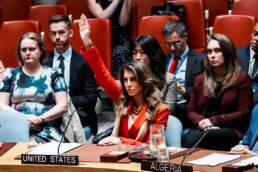المصادر:
نُشرت هذه الدراسة بالأصل في مجلة المستقبل العربي العدد 509 في تموز/يوليو 2021.
علي الجرباوي: أستاذ العلوم السياسية والدراسات الدولية، جامعة بيرزيت – فلسطين.
[1]Attila Marjan, «The New World Order and China’s Role in it,» Modern Diplomacy, 31 August 2015, <https://bit.ly/3iBcuOt>.
[2] Chen Jian, «From Mao to Deng: China’s Changing Relations with the United States,» Wilson Center, 13 November 2019, <https://bit.ly/3cDwtrZ>.
[3] Peng Bo, «China, Global Governance, and Hegemony: New-Gramscian Perspective in the World Order,» Journal of China and International Relations, vol.6, no.1 (2018), pp. 58-69, <http://somaesthetics.aau.dk/index.php/jcir/article/download/2363/1878/>.
[4] للإطلاع على حيثيات هذه المرحلة والتي تليها، انظر: Maurice Meisner, Mao’s China and After: A History of the People’s Republic, 3rd ed. (New York: The Free Press, 1999.
[5] Jinghao Zhou, «China’s Core Interests and Dilemma in Foreign Policy Practice,» Pacific Focus, vol. 45, no. 1 (April 2019), p. 39, <http://onlinelibrary.wily.com/doi/pdf/10.1111/pafo.12131>.
[6] عن موقع وزارة الخارجية الصينية، 14 تشرين الثاني/نوفمبر 2019، <http://www.fmprc.gov.cn>.
[7] A. Doak Barnett, «Ten Years After Mao,» Foreign Affairs, vol. 65, no. 1 (Fall 1986), <https://fam.ag/3weTLMG>.
[8] Iza Ding and Jeffrey Javad, «Why Maoism Still Resonates in China Today,» The Washington Post, 29/5/2019, <https://wapo.st/3weU6iq>, and Jun Mai, «Can China Ever Move from Mao Zedong?,» This Week in Asia, 10 September 2016, <https://bit.ly/3cB8QAz>.
[9] ياسين عامر عبد الجبار الربيعي، «واقع ومكانة الصين ومستقبلها في البنية الهيكلية للنظام الدولي: القيود والفرص،» (رسالة ماجستير جامعة الشرق الأوسط، 2018)، ص 31-34.
[10] Deng Xiaoping, «Socialism with Chinese Characteristics,» Works and Days, <https://bit.ly/3vcUP2t>.
[11] Yafei He, «China’s New Role in Global Governance: Shaping the Emerging World Order,» China Quarterly of International Strategic Studies, vol. 3, no. 3 (2017), pp. 346-347, <https://bit.ly/3zn5sCX >
[12] Xiang Xu and Alice Siqi Han, «Will China Collapse: A Review, Assessment and Outlook,» Hoover Institution, Economics Working Paper; no. 18104 (February 2018), pp. 5-10, <https://bit.ly/3wvvmm0>.
[13] جلال خشيب، الصعود الصيني عند الواقعيين الجدد (إسطنبول: المعهد المصري للدراسات، 2019)، ص 12.
[14] Henry Kissinger, On China (New York: The Penguin Press, 2011), p. 438.
[15] Elizabeth Economy, «China’s New-Maoist Moment: How Xi Jinping Is Using China’s Past to Accomplish What His Predecessors Could Not,» Foreign Affairs (1 October 2019), <https://fam.ag/3geSrno>, and Roderick MacFarquhar, «Searching for Mao in Xi Jinping’s China,» Boston Review, 8 September 2017, <https://bit.ly/3wioecV>.
[16] Robert D. Blackwill and Kurt M. Campbell, «Xi Jinping on the Global Stage,» Council on Foreign Relations, Council Special Report, no. 74 (February 2016), <https://on.cfr.org/3xkBxt9>.
[17] Timo Kivimaki, «Soft Power and Global Governance with Chinese Characteristics,» The Chinese Journal of International Politics, vol.7, no. 4 (2014), pp. 430-432.
[18] «النص الكامل لتقرير شي جين بينغ في المؤتمر الوطني التاسع عشر للحزب الشيوعي الصيني،» صحيفة الشعب اليومية أونلاين، 14/11/2017، ص 6، <https://goo.gl/BtUEBu>.
[19] Zhou, «China’s Core Interests and Dilemma in Foreign Policy Practice,» pp. 33-34.
[20] «النص الكامل لتقرير شي جين بينغ في المؤتمر الوطني التاسع عشر للحزب الشيوعي الصيني،» مصدر سابق، ص 6 و13.
[21] تمت معالجة رؤية الصين الاستراتيجية لهذه المراحل الثلاث في دراستي المعنّونة: علي الجرباوي، «الرؤى الاستراتيجية لثلاثي القطبية الدولية: تحليل مضمون مقارن،» سياسات عربية، العدد 31 (آذار/مارس 2018)، ص 14-16.
[22] «النص الكامل لتقرير شي جين بينغ في المؤتمر الوطني التاسع عشر للحزب الشيوعي الصيني،» مصدر سابق، ص 27.
[23] الاقتباسات ومرجعية القسم حول الثقافة الصينية من: عماد منصور، «السياسة الخارجية الصينية من منظار الثقافة الاستراتيجية،» سياسات عربية، العدد 21 (تموز/يوليو 2016)، ص 29-33.
[24] Congressional Research Service, «China’s Economic Rise: History, Trends, Challenges, and Implications for the United States,» (June 2019), <http://fas.org/sgp/crs/row/RL33534.pdf>.
[25] تم استقاء المعلومات من مصادر متعددة. انظر على سبيل المثال: Kimberly Amadeo, «China’s Economy and its Effect on the U.S. Economy,» The Balance (13 April 2020), <https://www.thebalance.com/china-economy-facts-effect-on-us-economy-3306345>.
[26] راجع الاستراتيجية الصينية لتحديث الجيش في الورقة البيضاء حول دفاع الصين. يمكن ايجاد النص في الرابط التالي والضغط على تاريخ 24 تموز/يوليو 2019، <http://www.andrewerickson.com>.
[27] عامر محسن، «الصين: الشفاء من الماضي،» الأخبار، 24/5/2018، <https://bit.ly/3wldb2m>.
[28] «النص الكامل لتقرير شي جين بينغ في المؤتمر الوطني التاسع عشر للحزب الشيوعي الصيني،» مصدر سابق، ص 26.
[29] Michael J. Mazarr, Timothy R. Heath, and Astrid Stuth Cevallos, «China and the International Order,» Rand Corporation (2018), p. 58, <https://www.rand.org/pubs/research_reports/RR2423.html>.
[30] انظر على سبيل المثال: «النص الكامل لخطاب الرئيس الصيني شي جين بينغ في قمة المديرين التنفيذيين للأبيك،»Arabic. News.CN، 18 تشرين الثاني/نوفمبر 2018، <http://arabic.news.cn/2018-11/18/c_137614358.htm>.
[31] لاحظ اللغة الإيجابية التي تستخدمها الصين في طرح دورها على الصعيد الدولي في: «النص الكامل لتقرير شي جين بينغ في المؤتمر الوطني التاسع عشر للحزب الشيوعي الصيني،» مصدر سابق، ص 27.
[32] منصور، «السياسة الخارجية الصينية من منظار الثقافة الاستراتيجية،» ص 35.
[33] Wang Jisi, «The Trends of Contemporary World Politics and China’s Global Role,» Procedia – Social and Behavioral Sciences, vol. 2, no. 5 (2010), pp. 6649-6652, <https://bit.ly/2RM6QOw>.
[34] Yafei He, «China’s New Role in Global Governance: Shaping the Emerging World Order,» p. 353.
[35] Kivimaki, «Soft Power and Global Governance with Chinese Characteristics,» pp. 427-433.
[36] انظر كأمثلة: Christopher Woody, «4 Ways China is Gaining Ground in Latin America,» Business Insider (18 December 2019), <https://bit.ly/3zoPMPy>.
انظر أيضًا: لحسن الحسناوي، «استراتيجية الوجود الصيني في أفريقيا: الديناميات… والانعكاسات،» المستقبل العربي، السنة 40، العدد 466 (كانون الأول/ديسمبر 2017)، ص 101- 124، وعاصم البرقان، «سياسة الصين اتجاه دول جنوب آسيا،» الحوار المتمدن، العدد 6313 (7 آب/أغسطس 2019)، <https://bit.ly/3pMEmka>.
[37] G. John Ikenberry and Darren J. Lim, «China’s Emerging Institutional Statecraft,» Brookings (April 2017), <https://brook.gs/3pKEeSm>.
[38] Isabel Hilton, «China Emerges as Global Climate Leader in wake of Trump’s Triumph,» The Guardian, 22/11/2016, <https://bit.ly/35bCXKN>.
[39] Mazarr, Heath, and Cevallos, «China and the International Order,» pp. 27-35 and 58-66.
[40] «IS China Contributing to the United Nations’ Mission,» China Power, 6 August 2019, <https://chinapower.csis.org/china-un-mission/>.
[41] البوابة، 24 أيلول/سبتمبر 2019، <http://albawabhnews.com/3739605>.
[42] WU You, «The Rise of China with Cultural Soft Power in the Age of Globalization,» Journal of Literature and Art Studies, vol. 8, no. 5 (May 2018), pp. 763-770; Hongying Wang and Yeh-Chung Lu, «The Conception of Soft Power and its Policy Implications: A Comparative Study of China and Taiwan,» Journal of Contemporary China, vol. 17, no. 56 (August 2008), pp. 427-431.
[43] Diego Torres, «China’s Soft Power Offensive,» Politico, 12/26/2017, <https://politi.co/3geusVA>.
[44] Eleanor Albert, «China’s Big Bet on Soft Power,» Council on Foreign Relations, 9 February 2018, <https://www.cfr.org/backgrounder/chinas-big-bet-soft-power>.
[45] Alex He, «The Belt and Rood Initiative: Motivation, financing, Expansion and Challenges of Xi’s Ever-expanding Strategy,» Center for International Governance Innovation, CIGI Papers, no. 225 (September 2019), <http://cigionline.org/sites/default/files/documents/no.225.pdf>.
[46] Arther Waldron, «Reflecions on china’s Need for a «Chinese World Order»,» Orbis, vol. 63, no. 1 (2019), pp. 3-10, <https://bit.ly/3vhXQyr>.
[47] Kivimaki, «Soft Power and Global Governance with Chinese Characteristics,» p. 421.
[48] Andrew Chatzky and James McBride, «China’s Massive Belt and Road Initiative,» Council on Foreign Relations, 28 January 2020, <https://www.cfr.org/backgrounder/chinas-massive-belt-and-road-initiative>.
[49] William Callahan, «Identity and Security in China: The Negative Soft Power of the Chinese Dream,» Politics, vol. 35, nos. 3-4 (2015), pp. 217-224.
[50] Dan Steinbok, «U. S.-China Trade War and Its Global Impact,» China Quarterly of International Strategic Studies, vol. 4, no. 4 (2018), pp. 518-520.
[51] فرانس 24، 1 تشرين الأول/أكتوبر 2019، <http://france24.com>.
[52] John Allen [et al.], «How the World Will Look after the Coronavirus Pandemic,» Foreign Policy, 20 March 2020, <https://bit.ly/3gfacDd>.
[53] Peter Rough, «How China is Exploiting the Coronavirus to Weaken Democracies,» Foreign Policy, 25 March 2020, <https://bit.ly/2SmY1LC>.
[54] Michael Green and Evan S. Medeiros, «The Pandemic Won’t Make China the World’s Leader,» Foreign Affairs, 15 April 2020, <https://fam.ag/3xhFxuF>.
[55] Paul Haenle, «What the Coronavirus Means for China’s Foreign Policy,» Carnegie Endowment for International Peace, 11 March 11, 2020, <https://bit.ly/3xfa0JM>.
بدعمكم نستمر
إدعم مركز دراسات الوحدة العربية
ينتظر المركز من أصدقائه وقرائه ومحبِّيه في هذه المرحلة الوقوف إلى جانبه من خلال طلب منشوراته وتسديد ثمنها بالعملة الصعبة نقداً، أو حتى تقديم بعض التبرعات النقدية لتعزيز قدرته على الصمود والاستمرار في مسيرته العلمية والبحثية المستقلة والموضوعية والملتزمة بقضايا الأرض والإنسان في مختلف أرجاء الوطن العربي.



